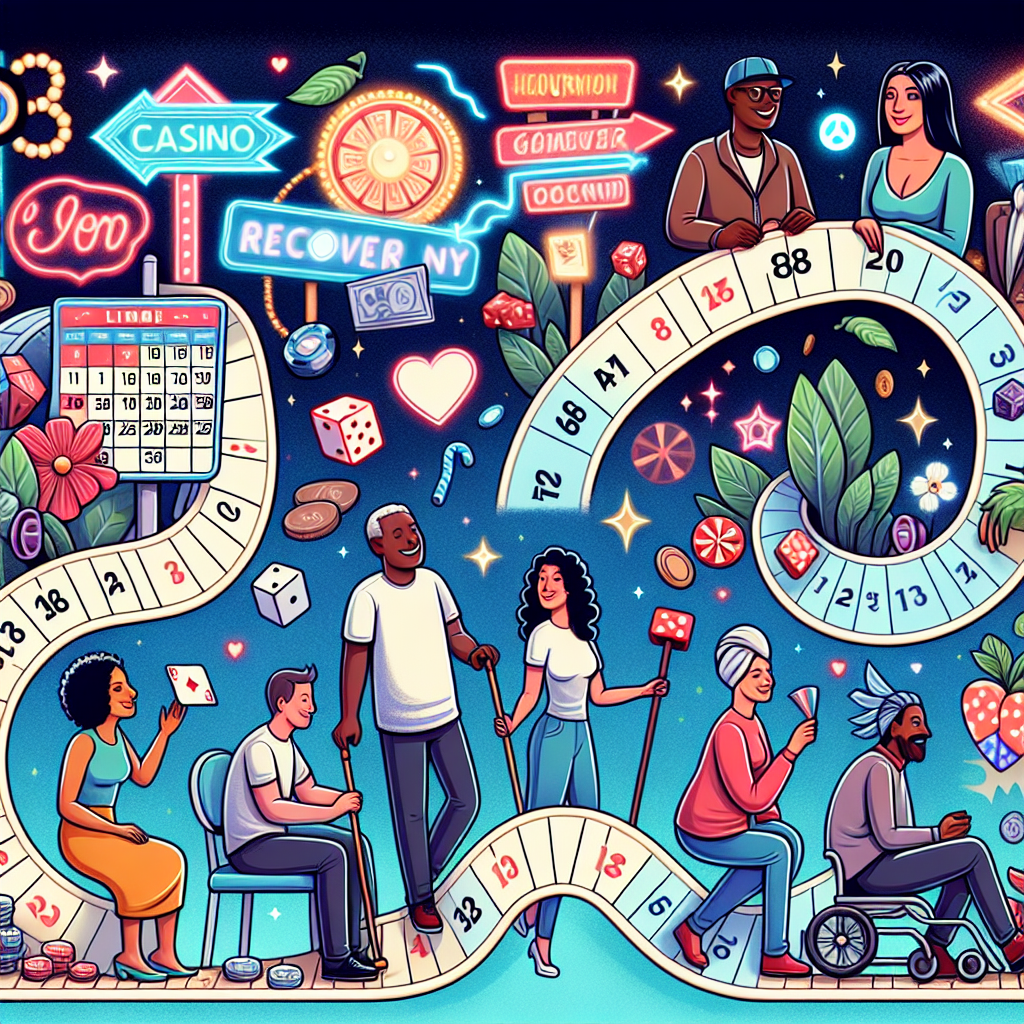-
Table of Contents

“Building a future of stability, health, and self-empowerment beyond gambling.”
Introduction
Gambling addiction recovery aims to achieve several long-term goals that focus on restoring the individual’s overall well-being and quality of life. These goals include maintaining sustained abstinence from gambling activities, rebuilding financial stability, and repairing relationships that may have been damaged due to the addiction. Additionally, recovery efforts strive to enhance the individual’s mental and emotional health, fostering resilience and coping mechanisms to handle stress and triggers without resorting to gambling. Ultimately, the long-term objectives are to empower the individual to lead a balanced, fulfilling life free from the compulsion to gamble, while also contributing positively to their community and personal relationships.
Developing Sustainable Coping Mechanisms for Long-Term Gambling Addiction Recovery
Recovering from gambling addiction is a journey that extends far beyond the initial phase of abstinence. While the immediate goal is to stop gambling, the long-term objectives are more nuanced and involve developing sustainable coping mechanisms that ensure lasting recovery. These goals are essential for maintaining a balanced and fulfilling life, free from the grip of addiction.
One of the primary long-term goals in gambling addiction recovery is to cultivate emotional resilience. This involves learning to manage stress, anxiety, and other emotional triggers without resorting to gambling as a coping mechanism. Emotional resilience can be developed through various therapeutic approaches, such as cognitive-behavioral therapy (CBT), which helps individuals identify and change negative thought patterns. Additionally, mindfulness practices, such as meditation and yoga, can provide tools for staying grounded and present, reducing the urge to escape into gambling.
Another crucial aspect of long-term recovery is rebuilding relationships that may have been damaged by the addiction. Gambling addiction often leads to broken trust and strained relationships with family and friends. Therefore, a significant goal is to repair these relationships through open communication, honesty, and consistent behavior changes. Support groups, such as Gamblers Anonymous, can offer a community of individuals who understand the challenges of recovery and can provide encouragement and accountability.
Financial stability is also a key long-term goal for those recovering from gambling addiction. The financial consequences of gambling can be devastating, leading to debt, bankruptcy, and loss of assets. Developing a realistic and manageable financial plan is essential for regaining control over one’s finances. This may involve working with a financial advisor, creating a budget, and setting achievable financial goals. By taking these steps, individuals can gradually rebuild their financial health and reduce the stress associated with financial instability.
In addition to emotional and financial recovery, finding new hobbies and interests is vital for sustaining long-term recovery. Gambling often consumes a significant amount of time and energy, leaving little room for other activities. Discovering new passions and interests can provide a sense of purpose and fulfillment that replaces the void left by gambling. Whether it’s engaging in sports, arts, volunteering, or learning new skills, these activities can enrich one’s life and contribute to overall well-being.
Moreover, maintaining a healthy lifestyle is an integral part of long-term recovery. Physical health and mental health are closely interconnected, and neglecting one can negatively impact the other. Regular exercise, a balanced diet, and adequate sleep are fundamental components of a healthy lifestyle. These practices not only improve physical health but also enhance mood and reduce stress, making it easier to resist the temptation to gamble.
Lastly, setting and achieving personal goals is a powerful way to stay motivated in recovery. These goals can be related to career, education, personal development, or any other area of life that brings a sense of accomplishment and satisfaction. By focusing on personal growth and progress, individuals can build a future that is rich with opportunities and free from the constraints of addiction.
In conclusion, the long-term goals of gambling addiction recovery are multifaceted and encompass emotional resilience, relationship repair, financial stability, new interests, a healthy lifestyle, and personal growth. By developing sustainable coping mechanisms in these areas, individuals can create a solid foundation for lasting recovery and a fulfilling life. The journey may be challenging, but with determination, support, and the right strategies, it is entirely possible to overcome gambling addiction and thrive in the long term.
Building a Support Network for Lasting Success in Gambling Addiction Recovery
Building a support network is a crucial component in achieving lasting success in gambling addiction recovery. The journey to recovery is often fraught with challenges, and having a strong support system can make a significant difference in overcoming these obstacles. One of the long-term goals of gambling addiction recovery is to establish and maintain a network of supportive individuals who can provide encouragement, accountability, and understanding throughout the process. This network can include family members, friends, support groups, and professional counselors, all of whom play a vital role in helping individuals stay on the path to recovery.
Initially, it is essential to recognize the importance of open communication with loved ones. Sharing the struggles and triumphs of recovery with family and friends can foster a sense of connection and reduce feelings of isolation. By being honest about the challenges faced, individuals can receive the emotional support needed to navigate difficult times. Moreover, involving loved ones in the recovery process can help them understand the complexities of gambling addiction, leading to more empathetic and effective support.
In addition to personal relationships, joining support groups can be incredibly beneficial. These groups provide a safe space for individuals to share their experiences, learn from others, and gain valuable insights into managing their addiction. Support groups, such as Gamblers Anonymous, offer a sense of community and belonging, which can be instrumental in maintaining motivation and commitment to recovery. The shared experiences within these groups can also provide practical strategies for coping with triggers and avoiding relapse.
Professional counseling is another critical element in building a robust support network. Therapists and counselors specializing in gambling addiction can offer personalized guidance and evidence-based interventions to address the underlying issues contributing to the addiction. Cognitive-behavioral therapy (CBT), for example, can help individuals identify and change negative thought patterns and behaviors associated with gambling. Regular sessions with a counselor can also provide a structured environment for setting and achieving recovery goals, ensuring that progress is continually monitored and adjusted as needed.
Furthermore, it is essential to recognize that building a support network is not a one-time effort but an ongoing process. As individuals progress in their recovery, their needs and circumstances may change, requiring adjustments to their support system. Staying connected with support groups, maintaining open communication with loved ones, and continuing professional counseling can help individuals adapt to these changes and sustain their recovery over the long term.
Another long-term goal of gambling addiction recovery is to develop healthy coping mechanisms and lifestyle changes that support overall well-being. Engaging in activities that promote physical, emotional, and mental health can reduce the reliance on gambling as a means of escape or stress relief. Exercise, hobbies, mindfulness practices, and social activities can all contribute to a balanced and fulfilling life, making it easier to resist the temptation to gamble.
In conclusion, building a support network is a fundamental aspect of achieving lasting success in gambling addiction recovery. By fostering open communication with loved ones, participating in support groups, seeking professional counseling, and continually adapting the support system to meet evolving needs, individuals can create a strong foundation for their recovery journey. Additionally, developing healthy coping mechanisms and lifestyle changes can further enhance overall well-being and resilience. With a comprehensive and dynamic support network in place, individuals can navigate the challenges of recovery and work towards a future free from the grip of gambling addiction.
Q&A
1. **Question:** What is one long-term goal of gambling addiction recovery related to financial stability?
**Answer:** One long-term goal of gambling addiction recovery related to financial stability is to achieve and maintain financial independence by managing debts, creating a budget, and building savings.
2. **Question:** What is a long-term goal of gambling addiction recovery concerning personal relationships?
**Answer:** A long-term goal of gambling addiction recovery concerning personal relationships is to rebuild trust and improve communication with family and friends, fostering healthier and more supportive relationships.
Conclusion
The long-term goals of gambling addiction recovery include achieving and maintaining abstinence from gambling, rebuilding and stabilizing personal and financial relationships, developing healthy coping mechanisms to manage stress and triggers, improving mental and emotional well-being, and fostering a sustainable lifestyle that supports ongoing recovery and personal growth.



